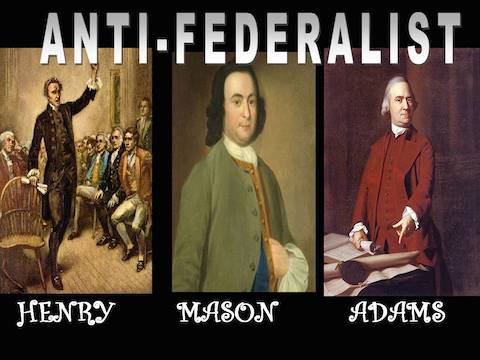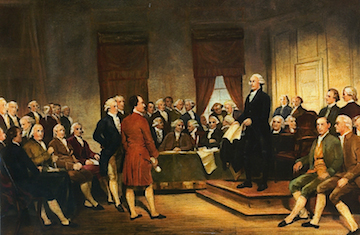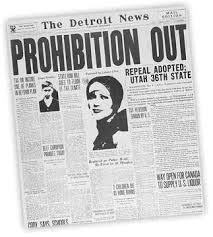Alcohol, Anti-Federalists and the Failure of the 21st Amendment
 I’ve been enjoying of late a review of the politics and ideologies of the American Revolutionary period. This period of our history has always been my favorite. But in enjoying a series of lectures, reading an old Bernard Bailyn history and looking over some primary documents, one thing has become clear to me. Today’s consistently discriminatory state laws concerning alcohol, the state laws that put out-of-state entities at a severe commercial disadvantage, amount to a refutation of one of the main arguments in the Anti-Federalist critique of the proposed national Constitution of the late 1780s.
I’ve been enjoying of late a review of the politics and ideologies of the American Revolutionary period. This period of our history has always been my favorite. But in enjoying a series of lectures, reading an old Bernard Bailyn history and looking over some primary documents, one thing has become clear to me. Today’s consistently discriminatory state laws concerning alcohol, the state laws that put out-of-state entities at a severe commercial disadvantage, amount to a refutation of one of the main arguments in the Anti-Federalist critique of the proposed national Constitution of the late 1780s.
Upon finalizing their draft of the new U.S. Constitution after a long, hot, summer sequestered in Independence Hall in Philadelphia, the founders let loose the documents on the 13 states. They needed 9 states to ratify this “revision” of the earlier adopted Articles of Confederation in order for it to become the foundational law of the land.
There was immediate opposition to the Constitution in nearly every state. Those opposing what would be a stronger central government under the Constitution, were primarily concerned that a strong central government as proposed would inevitable lead to tyranny. And among the most common critiques made by the “Anti-Federalists” and laid at the proposed document’s feet was that a central government as proposed was incapable of effectively governing such a large swath of land beginning in New England, down to Georgia and the land west to the Mississippi, recently obtained in the Peace Treaty signed after the end of the war.
The argument was that republican forms of government as proposed in the Constitution could only  effectively govern in small areas where the people would be of a similar nature. When laid over such a large area as the 13 states and the western lands, the Anti-Federalists claimed, republican government would lead to the gathering of interests group that would battle each other in seeking political gain. This, the Anti-Federalists argued, would lead to a collapse of the government when it was unable to govern effectively among the divided and battling interest groups.
effectively govern in small areas where the people would be of a similar nature. When laid over such a large area as the 13 states and the western lands, the Anti-Federalists claimed, republican government would lead to the gathering of interests group that would battle each other in seeking political gain. This, the Anti-Federalists argued, would lead to a collapse of the government when it was unable to govern effectively among the divided and battling interest groups.
The Anti-Federalists ultimately did not prevail and the Constitution was ratified. However, their arguments rang true with enough Americans that changes to the Constitution were made when the first Congress sat after ratification. Furthermore, when you consider the Civil War seventy years later and the continued North/South cultural divide afterwards, it’s easy to argue that the Anti-Federalist were correct. A country as large as the United States can’t be effectively governed and factions will arise.
Yet, the Anti-Federalists would have argued that factionalism would have brought down such a large federal state whether slavery existed or didn’t. The belief that federalism could only work in countries of limited area was an article of faith with many.
I don’t accept this argument. I think without slavery, there would not have been such divisive factionalism in late 18th and 19th century America and certainly the regional factionalism would not been nearly as intense. But that’s a discussion for another day.
What I want to point out is this: Consider just how protective states have been when they are granted authority than the federal government over important matters. Alcohol regulation is a perfect example. Without exception, states have and will erect protectionist barriers to competition in alcohol distribution and sales if given the opportunity. Imagine if states had the right to curtail interstate commerce the same way with industries like automobiles or books or transportation or crops?
Actually, you don’t have to imagine. Not only do you have the example of alcohol sales today where the states are granted the power to largely control that commercial field, but you also have pre-Constitutional America under the Articles of Confederation.
It turns out that under the Articles of Confederation, states did indeed erect barriers to trade in all sorts of goods, primarily by way of tariff. The protectionist tendencies of the individual states got so bad a convention was called to address just this issue and representatives showed up in Annapolis, Maryland to revise the Articles. They realized the problem was larger than they ever imagined and determined to call a larger convention of the states in Philadelphia in 1787. There, the Articles were not merely altered. They were thrown out.
Despite great debates at the Constitutional Convention over numerous issues, it appears that there was at least one issue that was not too hotly debated: The Commerce Clause.
 With this clause, control of interstate commerce was given over to the national government, rather than the states. It’s due to the Commerce Clause in Article 1, Section 8 of the Constitution that commercial disputes between the states have been relatively rare.
With this clause, control of interstate commerce was given over to the national government, rather than the states. It’s due to the Commerce Clause in Article 1, Section 8 of the Constitution that commercial disputes between the states have been relatively rare.
Except where alcohol is concerned.
The 21st Amendment that ended Prohibition also gave the states the power to regulate the sale and distribution of alcohol. It was something the Anti-Federalists would have whole heartedly supported. Yet it turns out that the 21st Amendment with its Anti-Federalist philosophy has been one of the most disastrous Amendments to the U.S. Constitution, caused chaos in the alcohol industry and is likely to continue to cause harm for decades to come.

Ironic that this debate took place in the Commonwealth of Pennsylvania, don’t you think?
A little bit, yes, Jeff.
While you are mainly concerned with the system as it pertains to alcohol, Tom, think about the other federalist-anti/federalist consepts:
We do not have a national education system; we do not have a national health care system (and that includes issues like abortion); in many cases, we do not have a national criminal law and criminal sentencing system; we certainly do not have a national legal marriage system; in fact, we do not have a national civil law system; we do not have a national tax system that treats all citizens equally (some states do not impose an income tax, state sales taxes are not universally applied; indeed, cost of living across the U.S. varies because of a variety of individual state madness; the list goes on.
Too early in the am: make that “concepts”
Yes, and then there is the “full faith and credit” clause that requires each state to respect the “public acts, records, and judicial proceedings of every other state,” which is not respected.
Accidents are only of the miseries caused by alcohol. One rarely discussed by very common is the mental degeneration caused by alcohol.
There is a truth in the world – The history of alcohol is the history of ruin. It’s true.
Drinking is and should always be an individual right. But society can be changed where it is looked upon as something one would never do.
Here are some anti-alcohol songs:
https://www.youtube.com/watch?v=KvIi9gazTkw (“The Irish Anti-Drinking Song” from the album “Ireland”.
https://www.youtube.com/watch?v=-zLNj-yzi04 (A modern rock song)
https://www.youtube.com/watch?v=w3Sv986wqVM (An acoustic blues number)